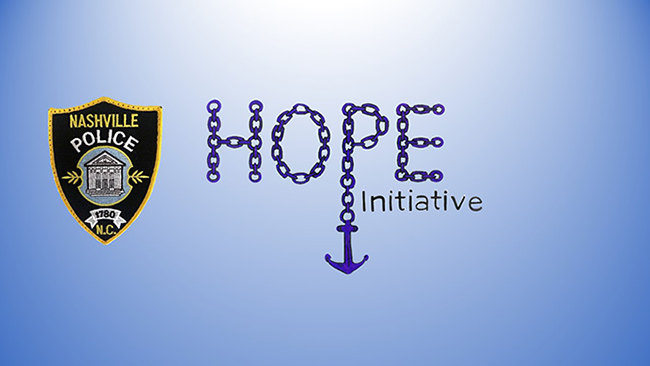
Hope Initiative Logo
The HOPE Initiative: A Community Partnership to Battle Opioid Addiction
One life at a time! That is the philosophy and passion behind the HOPE Initiative. The police department and community partners in Nashville, North Carolina, population 5600, launched the HOPE Initiative on February 9, 2016 to combat opioid addition.
If you want to know what the extent of the heroin problem is in your community, talk to the charge nurses or doctors at your local hospital; they will tell you how bad the opioid epidemic is in your area. There are millions of family members watching their loved ones slowly deteriorate from substance use disorder. Even more tragic are those families that lose loved ones to overdose. Embarrassed and ashamed because of the stigma that is attached to drug addiction, they are hiding in the shadows.
The Nashville Police Department (NPD) was seeing many overdose calls and wanted to help individuals with their disease, making the community safer and reducing crime. But arresting users and putting them into jails does not solve the problem. So what else can law enforcement do to help?
The HOPE Initiative, is the only program of its kind in North Carolina, assists individuals with substance use disorder to find treatment options and to get into long term recovery. While other state programs were centered solely around opioids, the HOPE Initiative was willing to accept any substance use disorder patient, including abusers of cocaine, alcohol, etc. During the planning and implementation  Chief Thomas Bashorephase, partnerships were established with the local district attorney’s office, Eastpointe (LME), UNC Nash Hospital, the Coastal Plain Hospital detox facility, the Police Assisted Addiction and Recovery Initiative (PAARI), and many others.
Chief Thomas Bashorephase, partnerships were established with the local district attorney’s office, Eastpointe (LME), UNC Nash Hospital, the Coastal Plain Hospital detox facility, the Police Assisted Addiction and Recovery Initiative (PAARI), and many others.
The program allows individuals to come to the NPD, turn over any drugs or paraphernalia without fear of charges, and to start their recovery process. The first HOPE Initiative participant came to the Nashville Police Department on February 17, 2016, in only the second week of the program’s existance. His story is typical of the many that would follow. He had received surgery for his knee and was given a prescription for Percocet. After receiving these opiates for several months, he became addicted, and at some point, the prescription had been cut off. Now the problem had grown to an addiction to opioids and the only alternative for him was to turn to heroin—much cheaper and with no need for a prescription. His life had spiraled out of control; he was losing the trust and help of his family; and he finally became involved with the criminal justice system. His life changed for the better when he walked into the NPD for assistance through the HOPE Initiative. He was taken to detox, accepted into a long-term treatment facility at no cost, and was on his way to getting his life back. Eleven months later he is still in recovery and doing very well—drug free.
The HOPE Initiative process starts when an individual makes contact with an officer or walks into the police department seeking help. They do not have to be residents of the town—or of the state, for that matter. NPD then contacts a volunteer, many of whom have faced substance abuse firsthand or watched a loved one struggle, who accompanies the participant through triage and detox admittance.
Finally, the initiative works with the families and other partners to find longer-term treatment options. In July 2016, Nash County funded Amanda Flory to take a transitional care social worker position at the detox facility to help with placing individuals in long-term treatment facilities. This simple move, coupled with the compassion that Amanda has for helping those with substance use disorder, has had extraordinary effects.
What has been the result of implementing the HOPE Initiative? Stronger partnerships with the district attorney’s office, social services, community corrections, the faith-based community, hospitals and clinics, treatment programs, and the community at large. In the past 12 months, 108 people have participated in the program, 53 have been placed in long-term treatment, 15 are awaiting long-term placement, 40 are currently in outpatient care programs, and only 12 have returned to using. Treatment programs are expensive and can range from several hundred to several thousand dollars for each 30-day stay. This complicates things, because many of those individuals who seek help have legal issues, a lack of income, and no health insurance. The HOPE Initiative does not use any ad valorem taxes to fund the program. It is funded through donations, grants, and fundraisers.
I would like to close with identifying some of the struggles and needs that have arisen out of Implementing the HOPE Initiative has identified points of struggle in combating addiction. First is the need to eliminate the stigma that prevents people from seeking assistance. Substance use disorder is a disease that must be treated, just like diabetes or cancer; it is not a lifestyle choice. Second, there is a huge need for more treatment facilities. The lack of bed space in long-term facilities can mean the difference between getting someone on the right path and their return to use. Many person-hours are spent trying to locate an open bed before the individual being helped has left the detox facility—but each one is worth the time. One life at a time!
Chief Thomas Bashore
Nashville Police Department
COPS Office Photo Contest – March Winner | The HOPE Initiative: A Community Partnership to Battle Opioid Addiction | Edna House for Women: A Grassroots Approach to Help Women Gain Sobriety | A History of Women in Law Enforcement
